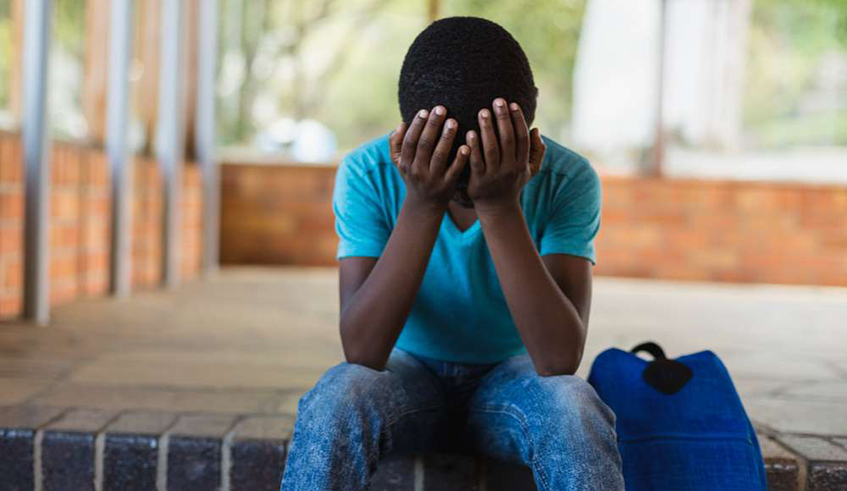

A story circulated on social media about a lady who noticed that her five-year-old daughter was not well. She took her to the doctor and to her horror, found out that her child had been sexually molested, by the driver who took her to school every day.
One may ask how long it took for the parent to notice this, or if the child had even complained about going to school and it was dismissed as another tantrum.
Listening is always the first step in solving problems, but juggling work schedules, parenting, household chores, some parents often feel stretched to the limit that they forget to pay attention to whatever children are saying.
"We tend to think that young kids are always seeking attention and so we ignore them and only care to listen when they throw tantrums,” Doreen Mutesi, a mother of one says.
Don’t ignore the signs
There are several signs that a child might be experiencing abuse. They might:
• be unhappy, scared or upset
• behave aggressively
• be antisocial or act like they are a lot older
• skip school
• find it hard to make friends
• have unexplained pain
• wet the bed
• look like they are not eating enough or have signs of physical neglect
• being scared to be alone with someone.
In an article titled ‘Recognising signs of abuse in children’, the author says, "You may like to have a calm conversation with the child, letting them know you have noticed that they don’t seem to be acting as they do normally (for example, they may seem sad or unwell). The child may tell you something about what they are experiencing. Listen, but don’t judge them and don’t pressure the child or say words you want them to say. It’s important that the words are theirs. Let them know that you are there to listen to them at any time.”
The ‘art of listening’
Listening, just like talking, however, to your child holds a lot of importance, as it helps your child develop trust, improves the bonding in a relationship, and builds a child’s confidence.
"Not many parents have the skill to ‘listen’, but with a conscious effort, they can develop it. Listening to your child’s perspective will teach you a lot because kids are smarter than most grown-ups think, and they generally know what they need,” Mutesi adds.
In many cases, Celestin Mutuyimana, a clinical psychologist and psychotherapist in Kigali, believes it has to do with how some parents were raised.
"Some parents have been raised neglected, beaten and so if they are not checked psychologically, they continue to use this kind of parenting on their children,” he says. He adds that without a parent being even aware of it, their day-to-day behaviour affects children in many ways, shaping their future character. "Everybody deserves and ought to be listened to and kids are not an exception. Your child learns the skills necessary to interact from the people in his life. Children who are unheard lose confidence and self-esteem, which can be detrimental to their development.”
Stuart Uwizeye, a father of two, says listening is not an easy task, and would take practice to be good at it.
"With all the craziness that goes on in our schedule, as a parent you would be tempted to raise your voice at your child who is trying to communicate something.
"Your child may say something that challenges your view or beliefs, or you may hear something that you are not happy about which is why it takes a lot of patience to really hear them out,” he says.
Esther Kabageni, a businesswoman and mother of two, says the urge to "fix” things and to keep everything in order is great, but the case should be different, especially for children who are just trying to communicate. "It’s amazing how children are creative and naturally have a unique perspective of the world. It’s also a pity that sometimes children’s ideas are either quickly dismissed or ignored. However, it is only by being engaged and talking to your little ones that you get to learn of their uniqueness and help them achieve their potential,” she says.
To solve poor listening skills, Mutuyimana believes that there is a need for positive parenting skills by developing listening skills in yourself first, before getting your child to talk to you.
"We often hear people telling parents to not beat their children, but they do not provide an alternative solution. This is why we need to give alternative solution for this which is positive parenting skills,” he says and further explains how:
"This can be done by giving enough time to children, listening to them at every issue raised, covering their needs, ensuring there is a positive mood at home, which includes a positive couple relationship.
"The first three points, it is important to have them accomplished in an authoritative way,” he emphasises.
For Mutesi, the trick to being attentive is by simply being present whenever you can.
"Obviously you can’t be there all the time, but when you are around at least make it count. There is no need for you to work your way to an excellent parent, but you can, however, give your child focused and necessary attention. Simple acts like when you smile at them and hug them and sing to them and listen to their interests, will let them know and trust that they are loved and cared for, and learn to be confident,” she says.
Kabageni adds, "Even as adults we crave attention. So it’s not wrong for our kids to seek validation through undivided attention. Sometimes our children just want us to listen to them and don’t come to us for a solution. "Look at your child’s body language and facial expressions. Listen to their tone and look into their eyes. Make it upon yourself to make them trust you for attention.”


